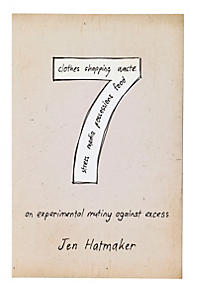I'd like to be sympathetic, really I would--with the impulse of avowed atheists to advocate for the separation of religion from government. Many people holding to all kinds of faiths also advocate for the wall between church and state in the United States. You don't need to be an atheist to believe it's a good idea. But I'm also distressed by the theocrats who use the argument: "if the atheists are for it, we should be agin' it." What's a thinking Christian to do?
The atheist position that
bothers me the most is the one that says "religion" itself is an evil force, that it contributes more harm than good to
life on earth, and that if we just eliminate "religion" human beings would be
much better off. This position is often
associated with a view that civilization’s progress is related to a
de-mythologizing process and religion is inherently superstitious. In order to make progress, societies have to follow a path that involves continual secularization and the removal
of religion from public life. There are way too many problems with
this line of reasoning to tackle here, but let me start with a few.
First of all what evidence does anyone have that “religion” is a
simple phenomenon that can be eliminated from human social life? Is there anywhere in the world a society that
is “religionless?” I think there is
compelling evidence that religion cannot be excised, any more than “culture”
can be eliminated or marginalized, or that there can be humans without language. (See my earlier posts about religion as the acquisition of spiritual language.) Religion
is a particular characteristic of human life on planet earth that is part of
every human community. One can have an
opinion about which of many particular “religions” may or may not contribute to
human flourishing, but that is not the same thing as getting rid of religion in
general. In fact, atheism and secularism themselves fit
most robust definitions of “religion.” A
“religion” is a set of shared cultural assumptions which may be adopted as a
universalizing world view, and which give a moral and ethical direction to
human life. Yes, atheism and secularism fit that
definition, and can be just as dogmatic about their beliefs. So let’s have a real
discussion about religion in a multi-religious world, and not the nonsense
about “getting rid of religion” in order to solve our human predicaments. I have a feeling that what atheists are arguing for is getting rid of any religion but theirs...something that should raise suspicions for any thinking person.
Secondly, the view that human progress involves a
de-mythologizing or secularization process is a by-product of the Enlightenment
in Western Europe, a fairly recent development in human philosophy. Does the
claim of secularization as the only road to human fulfillment hold up? Human progress, in the Enlightenment, was
tied to the spread of education, economic opportunity, and free ideas. However such “progressive” processes have
given rise to not only Western-style democracy, but also the crushing effects
of totalitarianism, such as in Nazi Germany and communist states, and the ruin
and injustices of unchecked capitalism. “Getting rid of religion” was the aim
of both the French revolutionists and the communist Soviet Union. It’s not at all clear that secularization has
given rise to unambiguously good results for civilization.
So when atheists claim to have the answer, thinking persons might ask them to rise to their own standards: prove it.







